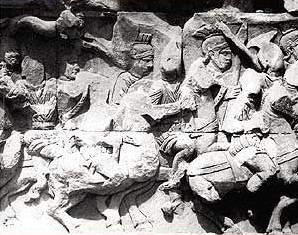

the last general claiming to be a Western Roman emperor was killed by the barbarians (486)
Romulus Augustus (475-476)
the Vandals (455)
the emperor Theodosius (380) made Christianity the official state religion of the Roman Empire

the battle of Adrianople (August 9, 378) was fought between a Roman army led by the Emperor
Valens and Germanic tribes (mainly Visigoths and Ostrogoths, assisted by some non-Germanic
Alans) commanded by Fritigern. It ended with an overwhelming victory for the Germanic tribes.
Historians see the Battle of Adrianople as the end of Antiquity and the beginning of the Middle Ages
Attila the Hun (452)
Alaric (410)
the Valentinian Dynasty (364-394)

Constantine I (313) ended all government-sanctioned persecution
of religion and especially of Christianity with the Edict of Milan
the battle of Milvian Bridge (October 28, 312) was fought between
the Roman Emperors Constantine the Great and Maxentius
the Byzantine empire (284-1453) is also referred to as the Eastern Roman Empire. It originated
with Diocletian who divided the Roman empire into a pars Orientis and a pars Occidentis. The
empire's capital was the city of Constantinople, formerly known as Byzantium and today known as
Istanbul. Constantine I, the emperor who ended all government-sanctioned persecution of religion
and especially of Christianity, made Byzantium the capital of the Roman Empire on May 11, 330
the Constantine Dynasty (284-364)
Illyrian Emperors (268-284)
Aureolus (268)
Mussius Aemilianus (251-262)
Quietus (260-261)
Macrianus Minor (260-261)
Macrianus Major (260-261)
Regalianus (260)
Ingenuus (258-260)
Saloninus (260)
Gallienus (253-268)
Valerian (253-260)
Aemilian (253)
Volusianus (251-253)
Gallus (251-253)
Hostilian (251)
Herennius Etruscus (251)
Licinianus (250)
Priscus (249-252)
Silbannacus (248)
Jotapian (248)
Pacantius (248)
Philip the Arab (244-249)
Sabinianus (240)
Gordian III (238-244)
Balbinus (238)
Pupienus Maximus (238)
Gordian II (238)
Gordian I (238)
the Crisis of the Third Century (235-284)
Maximinus Thrax (235-238)
Alexander Severus (222-235)
Elagabalus (216-222)
Diadumenian (217-218)
Macrinus (217-218)
Geta (209-211)
Caracalla (198-217)
Clodius Albinus (193-197)
Pescennius Niger (193-194)
Septimius Severus (193-211)
Didius Julianus (193)
Pertinax (193)
Commodus (177-192)
Avidius Cassius (175)
Lucius Verus (161-169)
Marcus Aurelius (161-180)
Antoninus Pius (138-161)
Hadrian (117-138)
Trajan (98-117)
Nerva (96-98)
Approximate date of assassination of Saturninus and Glaucia (95)
Assassination of Rutilius Rufus (92)
Assassination of Livius Drufus (91)
Domitian (81-96)
Titus (79-81)
the city of Pompeii (79) along with Herculaneum and many smaller places around the
Bay of Naples, were Roman municipalities destroyed during an eruption of the volcano
Mount Vesuvius
the third Servile War (73-71 bc)
the Colosseum (72)
Vespasian (69-79)
Vitellius (69)
Otho (69)
Galba (68-69)
Nero was deposed (68)
the Great Jewish Revolt (66-73) was the first of two major rebellions by the Jews of Judea against the Roman
Empire. It was followed up by Bar Kokhba's revolt in 132. The first revolt was unsuccessful, but the second
revolt led to the establishment of an independent state of Israel, which was conquered again by the Romans in 135
the Great fire of Rome erupted (July 19, 64)
Nero (54-68)
Claudius (41-54)
Caligula (37-41)
Tiberius (14-37)
the Limes (10)
in the battle of the Teutoburg Forest (9) an alliance of Germanic tribes led by Arminius wiped out
three Legions of unsuspecting Roman allies. The battle established the Rhine as the boundary of the
Roman Empire for the next few hundred years, until the decline of the Roman influence in the West
the Aeneid (19 bc)
the Pantheon (27 bc)
Pax Romana (27 bc - 180 ad)

Octavian (27bc-14ad)
the Roman empire (31 bc - 461 ad) was officially founded by Octavian, adopted son of Julius Caesar
who had conquered and added large parts of north western Europe to Rome's sphere of
influence
the naval battle of Actium (September 2, 31 bc) took place near the Roman colony of Actium in Greece, during
the Roman civil
war between Mark Antony and Octavian (later the Princeps Augustus). The fleet of Octavian was
commanded by Marcus Vipsanius Agrippa, and the fleet of Antony supported by the fleet of his wife,
Cleopatra, the queen of Egypt. The battle was won by the forces of Octavian and the date is now used
to mark the beginning of the Roman empire
the Roman Civil war (44-30 bc)

Julius Caesar (March 44 bc) was assassinated
the Julian calendar (46 bc) was introduced by Caesar, taking force in 45 bc
Caesar crossed the Rubicon, the frontier boundary of Italy (January 10, 49 bc) with only one legion and ignited civil war
the Gallic Wars (58-49 bc)
the Servile wars (73-71 bc)
the Mithridatic wars (88-65)
the Servile wars (104-103)
Gaius Gracchus (121 bc) and 3000 of his followers massacred by patricians
the Jugurthine War (122-105 bc) was fought between the Roman Republic
and Jugurtha, the renegade king of the African client state of Numidia
Land reformer Tiberius Gracchus (133 bc) murdered and hundreds of his followers killed
by followers of powerful Roman patricians; death of Scripio Africanus a few years later
the Servile wars (135-132 bc) were a series of slave revolts that plagued the late Roman Republic
the Punic wars (149-146 bc)
the Battle of Pydna (168 bc) between Rome and the Antigonid dynasty represents the start of the true power of Rome
the Circus Maximus (2nd century bc)
Archimedes (212 bc) uses burning-glass to set fire to Roman fleet at Syracuse,
nevertheless the city was conquered and he was killed
the Punic wars (218-202 bc)
the Punic wars (264-241 bc) were a series of wars
fought between Rome and the Phoenician city of Carthage
aquaeducts (312 bc)
the Via Appia (312 bc)
the Samnite wars (343 - 290 bc)
the Ludi Romani (366 bc)
Sicilian Wars (480-307 bc)
the Roman Republic (510 bc)
Rome (753-27 bc) as a city was founded in 753 by Romulus and his twin brother Remus